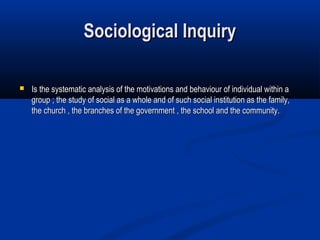
Sociological Inquiry
- 1. Sociological Inquiry Is the systematic analysis of the motivations and behaviour of individual within a group ; the study of social as a whole and of such social institution as the family, the church , the branches of the government , the school and the community.
- 2. Goals of Sociological Inquiry The basic goal of sociological inquiry is to obtain an understanding of the observable social world. To understand aspects of this social world, one has to observe phenomena in relation to particular point of time and place and realize how they were, how they are and how and why they have or have not changed.
- 3. Sociological Inquiry Procedure Defining Problem It is important that the researcher delimits the scope and breadth of the problem and define the phenomena to focus on. According to Bernard Barber, sociological inquiry is the collection and ordering of facts in terms of a conceptual theoretical model.
- 4. The Researcher Guide Concept: is defined variously by different sources. Philosophers and others generally agree that concepts are formed from experience and other pre-existing mental content by abstraction and other operations in the brain. Hypothesis: is a proposed explanation for a phenomenon. Theory: refers to scientific theories, which are proposed explanations of empirical phenomena, made in a way consistent with scientific method, that fulfil certain criteria. Operational Definition : defines something in terms of the specific process or set of validation tests used to determine its presence and quantity.
- 5. Gathering Of Data Primary Sources: Are original materials. Generally, primary sources are not accounts written after the fact with the benefit of hindsight. Secondary Sources: Is a document or recording that relates or discusses information originally presented elsewhere. A secondary source contrasts with a primary sources, which is an original source of the information being discussed; a primary source can be a person with direct knowledge of a situation, or a document created by such a person.
- 6. Analyzing of Data Independent and Dependent Variables: Are used in similar but subtly different ways in mathematics and statistics as part of the standard terminology in those subjects. They are used to distinguish between two types of quantities being considered, separating them into those available at the start of a process and those being created by it, where the latter (dependent variables) are dependent on the former (independent variables)
- 7. Moderating Variable: Is one that has a strong contingent effect on the independent variable and dependent variable relationship. Intervening Variable: Is one that surfaces between the time the independent variables start operating to influence the dependent variable and the time their impact is felt on it. Control Variables: Has different meanings, depending on the area/place in which it is used. The control variable is something that is constant and unchanged in an experiment.
